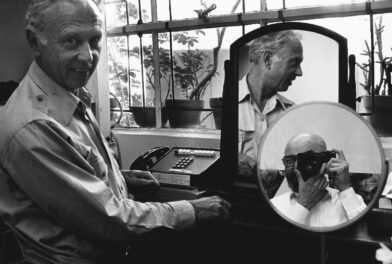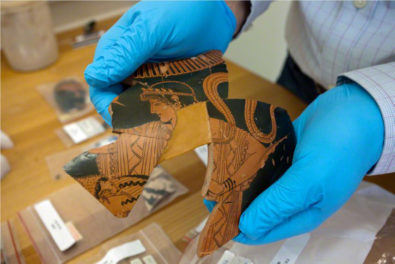Throughout 2013, the Getty community participated in a rotation-curation experiment using the Getty Iris, Twitter, and Facebook. Each week a new staff member took the helm of our social media to chat with you directly and share a passion for a specific topic—from museum education to Renaissance art to web development. Getty Voices concluded in February 2014.
The Middle East possesses a rich photographic heritage, yet many of its photographic collections are not catalogued—which means that little shared information on the photographic history of the region exists. And there are few trained conservators in the region to assist individuals and institutions in learning how to properly care for collections.
Fortunately, awareness of the importance of maintaining and caring for the region’s photographs is on the rise. As part of its work to further preservation of the world’s photographic heritage, the Getty Conservation Institute has partnered with the Arab Image Foundation, the Metropolitan Museum of Art, and the University of Delaware to create the Middle East Photograph Preservation Initiative (MEPPI). This initiative, funded in part by the Andrew W. Mellon Foundation, focuses on the countries of the eastern Mediterranean, North Africa, and the Persian Gulf.

View on the road to the Dead Sea, Palestine, 1955, Hisham Abdel Hadi. Abdel Hadi Family Collection. © Arab Image Foundation
I recently sat down with MEPPI project manager Tram Vo to learn more about the initiative. Launched in 2011, the initiative’s main goals, Tram told me, “are to raise awareness about photographic preservation and to bring training to the region, which lacks access to instruction in the safekeeping of photographs.”
In November 2011, MEPPI launched the first of three courses on photographic preservation for those caring for photographic collections in Middle Eastern countries. Each course involves an eight-day workshop, an eight-month period of practical work at the participant’s institution, and a final meeting to review the work and experience.
During the workshop, participants are taught to identify and properly care for photographs created using various types of processes. “It’s important to learn about the different photographic processes and what kind of deterioration they experience,” Tram told me. Deciding how to store photographs is another focus. “While a certain type of photograph can be safely housed with one material, another kind of photograph, made from a different process, may be harmed by that very same material.” With this knowledge, the colleagues responsible for the care of photographic collections can make well-informed decisions on proper handling and housing. Workshop discussions also cover advocacy, funding, and emergency preparedness.

MEPPI instructors and participants visiting the Bibliothèque Nationale du Royaume du Maroc (BNRM) in Rabat, Morocco
During the eight-month practical work phase that follows the workshop, participants do three targeted assignments to implement their new knowledge. The first is to give a presentation at their institution about what they learned at the MEPPI workshop. Those not affiliated with an institution write an article or give a public lecture. As their second assignment, participants survey the housing and handling of their collections. They then make recommendations on proper collections care based on what they’ve learned. Participants complete their final assignment at the follow-up meeting, which represents the final phase of training: sharing the work they’ve done over the eight months, what they’ve learned, and what they hope for. By the end of their course, participants have made significant changes in their collections—including reorganization, transport to more suitable storage places, and cataloging.

A stereocard of a panorama view of Cairo, photographer unknown. © Fouad Debbas Collection




The Getty is to be congratulated for it program to support the preservation of photographic images from the Middle East. The continuous destruction of religious, architectural, and natural sites in the region means that photograph may be the only way future generations will be able to visualize the true past glories of the region. I hope that the program will preserve all the facts of the past as well as the images. However, I find the caption of the photograph at the top of the item to be problematic. Palestine is the correct geographic location only if the photograph was taken before 1948. After 1948 the eastern approaches to the Dead Sea were all in the West Bank territory of Jordan. The automobile in the foreground is clearly a Rolls Royce and it should be possible to date the car from the configuration of the headlights and fenders as a clue to the correct dating of the image.
I love what you are doing, and I think that it is very important, but I must agree with the above writer that there was no Palestine in 1955. The photo was taken either in Israel or Jordan. Thanks in advance for correcting this.
The world is changing so fast. Congratulations for preserving images of things and places that no longer exist or are changing. The photo caption “Palestin 1955” needs a correction. Palestine ceased to exist in 1948. Part became Israel and another part became Jordon. Accuracy, as you know, is extremely important to the future. Continue successfully and accurately your important work.
Thank you for your interest in the Middle East Photograph Preservation Initiative.
We’d like to clarify that the caption that appears under the image to which you refer includes the title of the photograph (given either by the photographer or the current owner of the image) and the identity of the photographer and the current copyright holder. This type of information is standard for all photo reproductions. When reproducing images, we are obliged to include the title and other information exactly as specified by the copyright holder, in this case the Arab Image Foundation.
—The Getty Conservation Institute